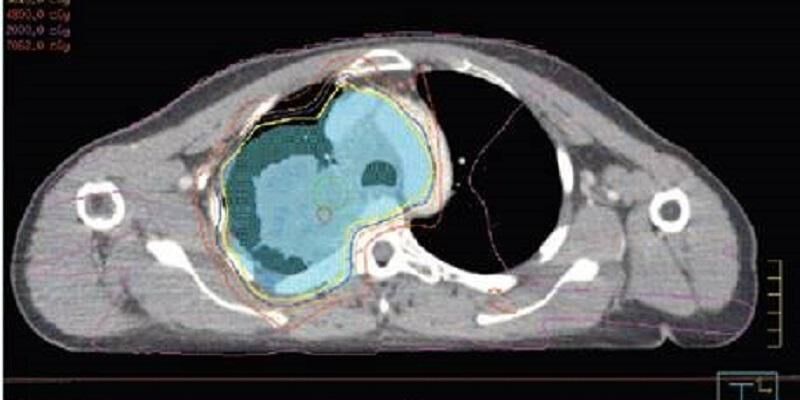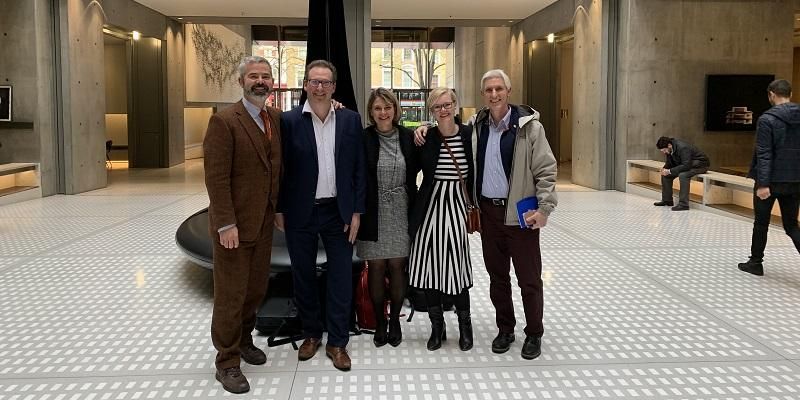
Scientists have been awarded £900,000 from Cancer Research UK to launch a groundbreaking clinical trial for people with lung cancer.
The CONCORDE trial will explore the use of new drugs alongside standard radiotherapy in the hope of improving survival for people with advanced non-small cell lung cancer (NSCLC).
The trial involves research teams from the universities of Leeds, Newcastle, Manchester and Glasgow.
Lung cancer is the third most common cancer in the UK, with about 47,800 people diagnosed each year. Between 80-85% of lung cancers in the UK are NSCL, which start in the mucus-making gland cells in the lining of the airways.
About one in four of NSCLC lung cancer patients is diagnosed with stage three disease, meaning that the cancer has spread from where it started to nearby tissue or lymph nodes.
“Its smart design means that we can study the benefit of a range of new treatments that target the tumour DNA.”
Radiotherapy is an important component of treatment in patients with this stage of NSCLC, and although it can successfully treat about half of these patients, outcomes remain poor for the other half, whose cancers are resistant to radiotherapy.
With the funding from Cancer Research UK, which was awarded before the pandemic, researchers are hoping that the new drugs will make radiotherapy more effective, increase its ability to eradicate tumour cells and potentially offer new hope to lung cancer patients.
Professsor David Sebag-Montefiore, Clinical Director at the Clinical Trials Research Unit and Leeds Cancer Research Centre at the University, said: “CONCORDE is a world-leading clinical trial that combines our excellence in clinical trials and radiotherapy research to offer exciting new treatment approaches for patients with lung cancer.
“Its smart design means that we can study the benefit of a range of new treatments that target the tumour DNA and that can be combined with radiotherapy to more effectively treat lung cancer.”
The researchers will start recruiting patients to the CONCORDE trial in December.
Combined effect of drugs and radiotherapy
Radiotherapy kills cancer cells by damaging their DNA. Human cells have developed lots of different methods of detecting and repairing damaged DNA, and many cancers are able to use these methods to survive a course of radiotherapy.
In recent years, however, scientists have developed drugs that interfere with these methods of DNA repair. These drugs are often referred to as ‘DNA damage response inhibitors’, or DDRi.
Professor Corinne Faivre-Finn, co-chief investigator of the trial, from the University of Manchester, said there was a need to improve outcomes for patients with stage three NSCLC treated with radiotherapy.
She added: “CONCORDE is a unique and innovative clinical trial designed to study the novel combinations of DDRi drugs and radiotherapy. It has been designed by a multidisciplinary team including oncologists, scientists and statisticians. We will be able to determine the recommended doses and safety profiles of up to five drugs.”
Dr Alastair Greystoke, from Newcastle University, chief investigator of the trial, described it as a huge breakthrough in terms of what might be possible for future treatments.
He added: “CONCORDE is a first of its kind multi-arm study that has been four years in the making. This trial will be at the forefront of drug-radiotherapy combination clinical trials and has the potential to transform the care for patients with lung cancer.”
The University of Leeds is the sponsor for the trial, with co-ordination by the Clinical Trials Research Unit, and will be responsible for the trial methodology, collection of data and analysis, whist overseeing all the sites involved.
Dr Sarah Brown, Director of Early Phase Trials in the Cancer Division at the Clinical Trials Research Unit at Leeds, said: “After such a long time in the planning, we are excited to have signed the agreements with AstraZeneca – and we will shortly start recruiting patients into the trial.
“This study brings together Cancer Research UK, the Clinical and Translational Radiotherapy Research Working Group, academics, scientists and the pharmaceutical industry to address areas of need in lung cancer and radiotherapy research with the aim of slowing the way the disease spreads and improving survival.”

Some of the scientists leading the research, pictured before coronavirus. From left to right: Professor Anthony Chalmers, University of Glasgow; Dr Alastair Greystoke, Newcastle University; Professor Corinne Faivre-Finn, The University of Manchester; Dr Sarah Brown, University of Leeds; and Professor Andy Ryan, University of Oxford.
The University is grateful to Yorkshire Cancer Research for their support to enable the methodological development of this innovative phase one design.
The University of Leeds has a strong track record in cancer research:
- The Leeds CRUK Clinical Trial Unit has investigated better and less toxic treatments for patients with blood cancers and treatments involving radiotherapy.
- Leeds CRUK Radiotherapy Research Centre of Excellence combines artificial intelligence, magnetic resonance imaging and new drugs with radiotherapy to target pelvic, liver and brain cancers. It is part of a national network RadNet.
Further information
- Top image shows a cross-section image of a patient's thorax with stage three non-small cell lung cancer. The image is used to help plan radiotherapy treatment.
- For more information, please email David Lewis in the press office at the University of Leeds on: d.lewis@leeds.ac.uk